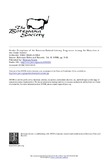| dc.contributor.author | Maruatona, T.L. | |
| dc.date.accessioned | 2013-08-07T09:40:11Z | |
| dc.date.available | 2013-08-07T09:40:11Z | |
| dc.date.issued | 1998 | |
| dc.identifier.citation | Maruatona, T. (1998) Gender perceptions of the Botswana Literacy Programme among the minorities in the Chobe District, Botswana Notes and Records, Vol 30, pp. 9-26 | en_US |
| dc.identifier.issn | 0525-5090 | |
| dc.identifier.uri | http://hdl.handle.net/10311/1152 | |
| dc.description.abstract | This paper discusses a gender analysis of the perceptions of the Basubiya in North Western Botswana towards participation and utilization of the Botswana National Literacy Programme (NLP). The need to determine the effects of the National Literacy Programme on the lives of the learners continues to be a major concern to adult educators, Programme administrators and adult education researchers. The paper identifies reasons for participation in the programme among the minorities form a gender perspective. It explores the effects of the programme on the lives of men and women in Chobe in terms of how they utilized the literary and practical skills to improve their lives. Finally, the study examines the teaching and learning and general problems they had as learners in the National Literacy Programme. The paper concludes that there were no significant gender differences in terms of the reasons for enrollment in the NLP. However, there were some gender differences in the division of labour which in turn influenced their use of the skills acquired in their various social roles. Consequently, the learners noted that the programme enabled them to perform their roles as men and women in Chobe more effectively. | en_US |
| dc.language.iso | en | en_US |
| dc.publisher | BNR, http://www.botsoc.org.bw | en_US |
| dc.subject | Botswana National Literacy Programme | en_US |
| dc.subject | Adult education researchers | en_US |
| dc.subject | Gender | en_US |
| dc.subject | National Literacy Programme | en_US |
| dc.title | Gender perceptions of the Botswana Literacy Programme among the minorities in the Chobe District | en_US |
| dc.type | Published Article | en_US |
| dc.link | http://www.jstor.org/stable/40980201 | en_US |

